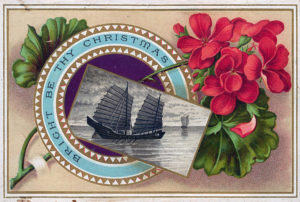Welcome to the ninth day of our Cotton Famine Christmas Countdown! To get us in the festive (sort of) spirit, we’re featuring a seasonal Cotton Famine Poem every day in the run up to our special Christmas event with Jennifer Reid on 20th December. Free tickets for the event are available here: https://www.eventbrite.co.uk/e/the-twelve-cotton-famine-poems-of-christmas-tickets-52954230529
Today’s poem was originally published in the Cornhill Magazine, and reprinted in the Bolton Chronicle on December 27th, 1862. The commentary was written by Olivia Galyer, a student on the ‘Poetry and Politics’ module in the Department of English at the University of Exeter.
A CHRISTMAS CAROL FOR 1862
By George MacDonald
From Cornhill Magazine for January
The skies are pale, the trees are stiff,
The earth is dull and old;
The frost is glittering, as if
The very sun were cold.
And Hunger fell is linked with Frost,
To make man grey and wan:
Come Babe, from heaven, or we are lost;
Be born, O child of man.
The children cry, the women shake,
The strong men stare about;
They sleep when they would keep awake –
They wake ere night is out.
For they have lost their heritage –
No sweat is on their brow:
Come, Babe, and bring them work and wage;
Be born, and save us now.
Across the sea, beyond our sight,
Roars on the fierce debate;
Down go the men in bloody fight,
The women weep and hate.
And in the right be which that may,
Surely the strife is long:
Come thou, O Child, thy lowly way,
And right will have no wrong.
Good men speak lies against thine own –
Tongues quick, and hearing slow;
They will not let thee walk alone,
And think to serve thee so:
If they the children’s freedom saw,
In thee, the children’s king,
They would be still with holy awe,
Or only speak to sing.
Some neither lie, nor starve, nor fight,
Nor yet the poor deny;
But in their hearts all is not right –
They often sit and sigh.
Earth cries with all her nights and days,
Grey frosts and golden corn;
The travailing creation prays:
O Son of God, be born.
Commentary
In this carol George MacDonald describes the harsh effects of the Lancashire Cotton Famine on innocent people who appear powerless to improve their poverty-stricken lives. Men having been denied the ability to work are left emasculated while the low temperature of the environment appears to mirror the low spirits of the people in a form of pathetic fallacy. The cold weather compounds the suffering of the people with their hunger hastening the aging process of men. Against these desperate conditions the speaker pleads for the intervention of religion, calling for the birth of Christ in a repeated refrain to fulfil his role as the savior of humankind by providing these people with the ability to work and earn money.
Formally the carol has a regular ABAB rhyme scheme and is comprised of five octet stanzas with the lines in each stanza alternating between iambic tetrameter and iambic trimeter. The only time the meter changes is in the seventh line of the first stanza when the speaker questions whether humankind is ‘lost’ with the shift in meter reflecting this sense of loss. McDonald makes reference to the destructive consequences of the American Civil War both in America, with the country’s men fighting, and internationally with the American supply of raw cotton to Europe cut off devastating the Lancashire community as a result. The fact that ‘the strife is long’ is important with the cotton that had already been supplied to Lancashire used up, and for prolonging the suffering of the Lancashire people with ostensibly ‘good’ men resorting to telling lies for their own benefit. The speaker highlights in the final stanza how even those who are not directly implicated by the famine can acknowledge that it is ‘not right’ with even the Earth personified as crying.
Olivia Galyer, University of Exeter

A Victorian Christmas Card, from Nova Scotia Archives on flickr.com